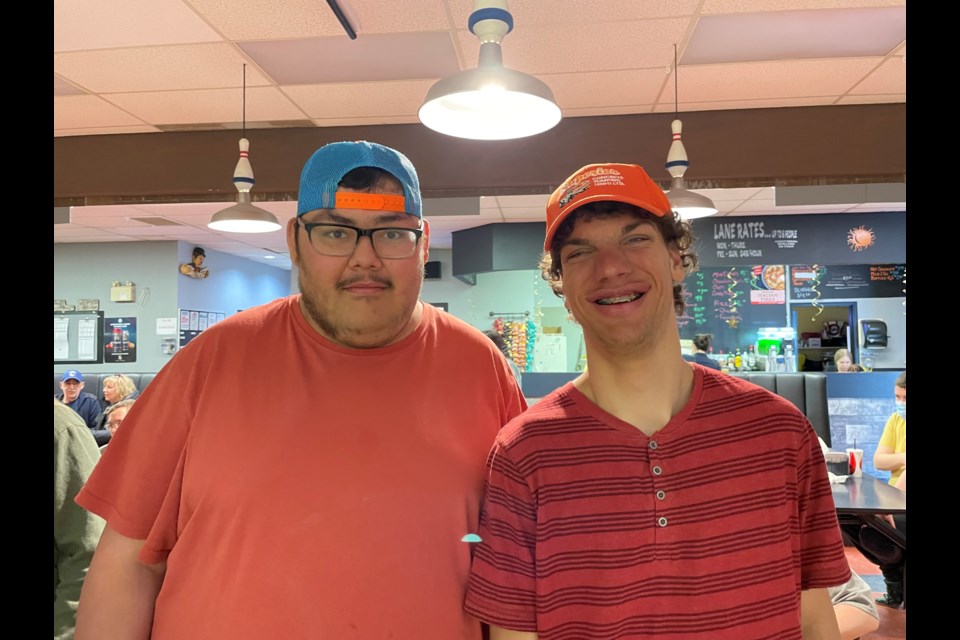COLD LAKE – As the Bowling season for Special Olympics Lakeland wrapped up on May 19 at the Marina Bowling Centre in Cold Lake, it was a cause for celebration for athletes who had spent much of the pandemic apart.
Beginning as an impromptu bowling season, the easing of public health restrictions earlier in the year created an opportunity for organizers of the Special Olympics Lakeland Chapter to begin hosting community activities once again.
Awards were also handed out to athletes that had achieved a variety of successes throughout the bowling season.
“We had one of our athletes, Colin (Booker), he had gotten four strikes in a row - a Four Bagger - so we gave him a special award for that,” said Jessie Heisler, a board member with the Lakeland Special Olympics.
Awards were also handed out for a “Medal Worthy Friendship,” high scores, and for long time athletes.
“It was a nice gathering because a lot of these athletes really haven't been able to gather together with COVID. It was nice to have everyone see each other,” Heisler told Lakeland This Week.
With the conclusion of the bowling season, volunteers and athletes will be shifting gear to spring and summer programs. Bocce ball will run from June 16 to Aug. 11, golf programs are expected to have registration dates lined up soon, and a curling program is anticipated for the fall.
Special Olympics Lakeland will also be partnering with Challenger Baseball that is running baseball programming out of Cold Lake through the summer.
12 and up
Heisler says the one thing she wants to stress, is that Special Olympics in the Lakeland is for anyone over the age of 12 who has a developmental disability.
“It's not just for adults... I think that a lot of the youth with developmental disabilities aren't entering into this really supportive community because they're unaware that they can,” she explained.
“We don't really have a lot of younger athletes and I'm thinking that's because a lot of people associate us with adults, but it's actually 12 and up.”
Despite the lack of youth representation, Special Olympics Lakeland is growing rapidly.
“Right before COVID, we only had about 20 athletes and our numbers were pretty low at that point. But since COVID and with a new board that is a little younger and on social media, we have expanded exponentially. We have got 40 to 50 athletes attending some of these programs at one time,” said Heisler.
“So that is opening a few possibilities for us, there is the Alberta Special Olympics Games that's happening next year in 2023... and from there it opens possibilities, depending how we do, for regional competitions and national competitions as well.”
For now, organizers are looking to local competitions that are set to take place in Vermilion and Wainright in the near future.
Growing demand means growing needs
“We are a non-profit. So, with COVID we really had a lot of fundraising opportunities stripped from us. We had those in-person situations removed. So now that we're back, and we come back with as 50 athletes, we are having to program and pay for them because a lot of these athletes are very low income and can't afford substantial programming costs,” explained Heisler.
The organization covers the cost of jerseys and bus transportation from select locations such as the Bonnyville and District Centennial Centre (C2).
“Especially because we are a dual city (organization) – Bonnyville and Cold Lake – we have to pay for a lot of busing between Bonnyville and Cold Lake. With that big increase of athletes, our participant numbers have really strained some of the funds.”
Heisler continued, “It's great that our community has grown so well, it's just we didn't really have any time to prepare for it fund wise.”
However, that has only sparked more motivation to get more athletes and volunteers out and joining programs.
“It is extremely supportive and even after COVID you can feel the difference. Everyone just seems so happy to be there. And we have boys showing up at four because they're so excited. They just want to make sure they get on the bus that doesn’t leave until five,” she laughed.
“If we are your closest chapter... we definitely encourage people to come.”
Athletes from communities as far as Frog Lake and Kehewin Cree Nation have taken part in the past, Heisler says, “Which isn’t an issue as long as athletes can find their way to the C2 where buses collect and drop off participants.”



